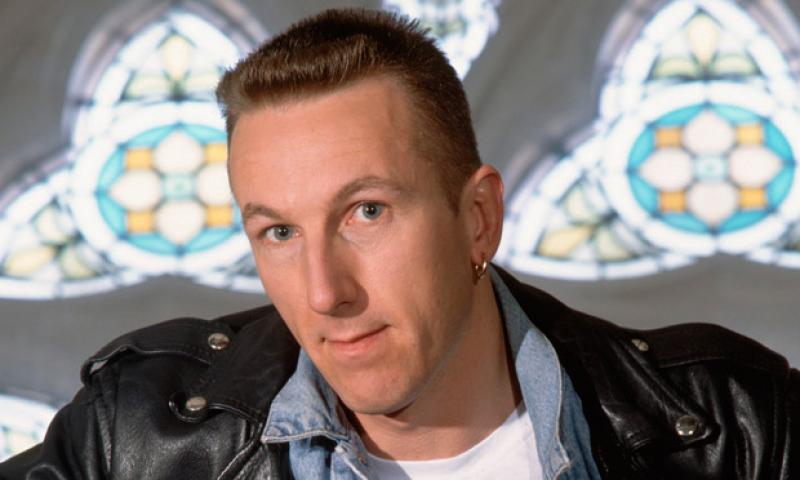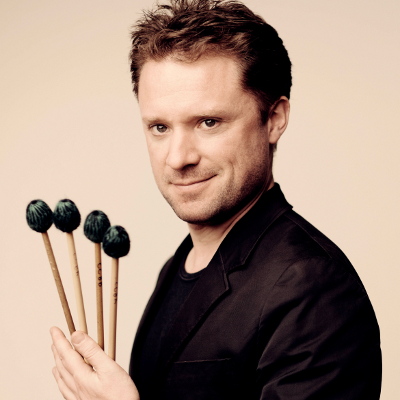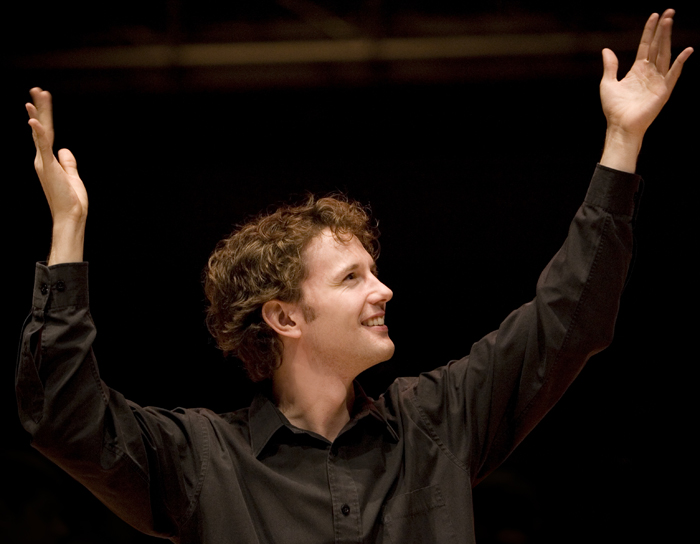Currie, Aurora Orchestra, Collon, QEH | reviews, news & interviews
Currie, Aurora Orchestra, Collon, QEH
Currie, Aurora Orchestra, Collon, QEH
Star percussionist leads tribute to maverick composer Steve Martland, but John Adams rules

It has always been obligatory when talking about Steve Martland to describe him as an iconoclast. Before his sudden death in May 2013 at the age of 58, he forged a reputation for himself as a self-styled outsider to the musical establishment, speaking scathingly about the Proms, and eschewing established orchestras and ensembles in favour of writing for his eponymous band.
There were two Martland pieces to enjoy, one in each half. Starry Night, for amplified string quartet and marimba, was written for Colin Currie (pictured below right by Marco Borggreve) in 2008. It takes its title from Van Gogh’s painting but was inspired by a visit to Africa. It is cast in a post-minimalist language of overlapping phrases, irregular rhythms and a constant semiquaver pulsation which showed the influence of Louis Andriessen, Martland’s teacher. The beginning is marked sempre fortissimo and this would be a good epigraph for Martland’s entire oeuvre. Typically, there is not much in the way of textural or dynamic variety, but enough rhythmic propulsion to carry the music along.
 The second piece of Martland, rounding off the evening, was Horses of Instruction from 1995. This was performed in the sextet version, written for the Bang on a Can All-Stars, without the drum kit added later, and which can dominate performances of the expanded version. The performance featured members of the Steve Martland Band, including a heroic turn from pianist Dave Maric, pounding away tirelessly in the low registers. Friendly music this is not; intense and compelling, yes, but not for the fainthearted. The end was extraordinary, manically driven, like an electrified Rite of Spring played at triple speed.
The second piece of Martland, rounding off the evening, was Horses of Instruction from 1995. This was performed in the sextet version, written for the Bang on a Can All-Stars, without the drum kit added later, and which can dominate performances of the expanded version. The performance featured members of the Steve Martland Band, including a heroic turn from pianist Dave Maric, pounding away tirelessly in the low registers. Friendly music this is not; intense and compelling, yes, but not for the fainthearted. The end was extraordinary, manically driven, like an electrified Rite of Spring played at triple speed.
The highlight of the first half did not actually involve either Colin Currie or Steve Martland. John Adams’s Chamber Symphony is not typical of his output, and is Adams for people who don’t like Adams. Taking its starting point from the cartoon scores his son was watching, the Chamber Symphony has an abrasive sound and rhythmic edginess which is a world away from the saccharine of some of his orchestral works. The Aurora Orchestra players excelled in the demands of the piece, which they have recorded for imminent release, and is clearly in their fingers at the moment. The Chamber Symphony presented a bristling wall of sound, bursting with energy, driven and furious.
Conductor Nicholas Collon (pictured below by Benjamin Ealovega) kept his players on a tight rein, but gave them room to shine in their acrobatic solos, of which the most notable was Amy Harman’s bassoon. The technical demands of the music were dispatched with easy virtuosity, and the ensemble playing was extremely tight, making for the best performance I have ever heard of this piece.
 The pianist from Horses of Instruction, Dave Maric, was the composer of Trilogy, a work for solo percussionist with a backing soundtrack of further percussion instruments, electronically enhanced. This is a showpiece which Colin Currie played from memory on 22 instruments, often several at the same time. The live music was seamlessly co-ordinated with the taped part, and the effect was of Currie duetting with himself. The music was engaging, clearly influenced by Martland and, to a lesser extent, Steve Reich.
The pianist from Horses of Instruction, Dave Maric, was the composer of Trilogy, a work for solo percussionist with a backing soundtrack of further percussion instruments, electronically enhanced. This is a showpiece which Colin Currie played from memory on 22 instruments, often several at the same time. The live music was seamlessly co-ordinated with the taped part, and the effect was of Currie duetting with himself. The music was engaging, clearly influenced by Martland and, to a lesser extent, Steve Reich.
A moment of repose was offered in Purcell’s Fantasia Upon One Note, originally for five viols, of which one sustains a single note throughout. Here the string quartet imitated the viols – no vibrato, forward sound – while the sustained note was a beautifully controlled marimba roll. A cool piece of programming, this exquisite fragment, beloved of Steve Martland, threw into relief the hectic sprinting elsewhere, and showed another, unexpected, side of his musical personality.
- Metal Wood Skin: The Colin Currie Percussion Festival continues at the Southbank Centre
- Follow Bernard Hughes on Twitter @bernardlhughes
rating
Explore topics
Share this article
Add comment
The future of Arts Journalism
You can stop theartsdesk.com closing!
We urgently need financing to survive. Our fundraising drive has thus far raised £49,000 but we need to reach £100,000 or we will be forced to close. Please contribute here: https://gofund.me/c3f6033d
And if you can forward this information to anyone who might assist, we’d be grateful.

Subscribe to theartsdesk.com
Thank you for continuing to read our work on theartsdesk.com. For unlimited access to every article in its entirety, including our archive of more than 15,000 pieces, we're asking for £5 per month or £40 per year. We feel it's a very good deal, and hope you do too.
To take a subscription now simply click here.
And if you're looking for that extra gift for a friend or family member, why not treat them to a theartsdesk.com gift subscription?
more Classical music
 Bizet in 150th anniversary year: rich and rare French offerings from Palazzetto Bru Zane
Specialists in French romantic music unveil a treasure trove both live and on disc
Bizet in 150th anniversary year: rich and rare French offerings from Palazzetto Bru Zane
Specialists in French romantic music unveil a treasure trove both live and on disc
 Scottish Chamber Orchestra, Ibragimova, Queen’s Hall, Edinburgh review - rarities, novelties and drumrolls
A pity the SCO didn't pick a better showcase for a shining guest artist
Scottish Chamber Orchestra, Ibragimova, Queen’s Hall, Edinburgh review - rarities, novelties and drumrolls
A pity the SCO didn't pick a better showcase for a shining guest artist
 Kilsby, Parkes, Sinfonia of London, Wilson, Barbican review - string things zing and sing in expert hands
British masterpieces for strings plus other-worldly tenor and horn - and a muscular rarity
Kilsby, Parkes, Sinfonia of London, Wilson, Barbican review - string things zing and sing in expert hands
British masterpieces for strings plus other-worldly tenor and horn - and a muscular rarity
 From Historical to Hip-Hop, Classically Black Music Festival, Kings Place review - a cluster of impressive stars for the future
From quasi-Mozartian elegance to the gritty humour of a kitchen inspection
From Historical to Hip-Hop, Classically Black Music Festival, Kings Place review - a cluster of impressive stars for the future
From quasi-Mozartian elegance to the gritty humour of a kitchen inspection
 Shibe, LSO, Adès, Barbican review - gaudy and glorious new music alongside serene Sibelius
Adès’s passion makes persuasive case for the music he loves, both new and old
Shibe, LSO, Adès, Barbican review - gaudy and glorious new music alongside serene Sibelius
Adès’s passion makes persuasive case for the music he loves, both new and old
 Anja Mittermüller, Richard Fu, Wigmore Hall review - a glorious hall debut
The Austrian mezzo shines - at the age of 22
Anja Mittermüller, Richard Fu, Wigmore Hall review - a glorious hall debut
The Austrian mezzo shines - at the age of 22
 First Person: clarinettist Oliver Pashley on the new horizons of The Hermes Experiment's latest album
Compositions by members of this unusual quartet feature for the first time
First Person: clarinettist Oliver Pashley on the new horizons of The Hermes Experiment's latest album
Compositions by members of this unusual quartet feature for the first time
 Gesualdo Passione, Les Arts Florissants, Amala Dior Company, Barbican review - inspired collaboration excavates the music's humanity
At times it was like watching an anarchic religious procession
Gesualdo Passione, Les Arts Florissants, Amala Dior Company, Barbican review - inspired collaboration excavates the music's humanity
At times it was like watching an anarchic religious procession
 Classical CDs: Camels, concrete and cabaret
An influential American composer's 90th birthday box, plus British piano concertos and a father-and-son duo
Classical CDs: Camels, concrete and cabaret
An influential American composer's 90th birthday box, plus British piano concertos and a father-and-son duo
 Cockerham, Manchester Camerata, Sheen, Martin Harris Centre, Manchester review - re-enacting the dawn of modernism
Two UK premieres added to three miniatures from a seminal event of January 1914
Cockerham, Manchester Camerata, Sheen, Martin Harris Centre, Manchester review - re-enacting the dawn of modernism
Two UK premieres added to three miniatures from a seminal event of January 1914
 Kempf, Brno Philharmonic, Davies, Bridgewater Hall, Manchester review - European tradition meets American jazz
Bouncing Czechs enjoy their Gershwin and Brubeck alongside Janáček and Dvořák
Kempf, Brno Philharmonic, Davies, Bridgewater Hall, Manchester review - European tradition meets American jazz
Bouncing Czechs enjoy their Gershwin and Brubeck alongside Janáček and Dvořák
 Solomon, OAE, Butt, QEH review - daft Biblical whitewashing with great choruses
Even a top soprano and mezzo can’t make this Handel paean wholly convincing
Solomon, OAE, Butt, QEH review - daft Biblical whitewashing with great choruses
Even a top soprano and mezzo can’t make this Handel paean wholly convincing

Comments
Steve was 58 at the time of
Duly altered on Bernard's
Duly altered on Bernard's behalf, Anon. Thanks for the correction.